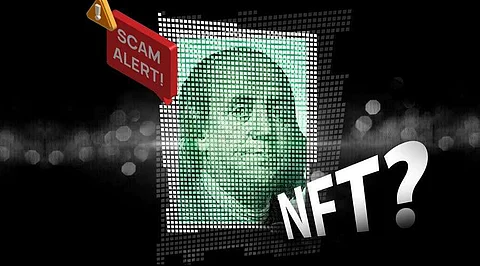

Have you ever wondered about turning your paintings into a priceless work of art? Or selling your dance moves for worth a million? Well, wake up and smell the blockchain technology, my friend, as NFT is here to make your wildest dreams come true! With NFTs, you can own a unique digital asset that can be traded in exchange for money, cryptocurrencies, or any other NFTs. Even though NFTs have been present in obscure parts of the internet since 2014, they have gained massive popularity in the last two years, making them multi-billion-dollar businesses. But as the market has grown, it has also resulted in the rise of NFT scams. In this article, we will discuss the different types of NFT scams and how to avoid NFT scams. But let us first understand what NFT is.
NFTs or Non-Fungible Tokens are unique digital assets that belong solely to the owner, existing on a blockchain. The word "fungible" basically means "interchangeable." For instance, since you may trade one bitcoin for another while maintaining the same amount of value, bitcoins are fungible. Due to its uniqueness and inability to be directly substituted by another NFT, an NFT is non-fungible. Digital media such as images, movies, audio files, and more can all be used as NFTs.
Depending on the value that the market and owners have assigned to NFTs, they can be traded or swapped for cash, cryptocurrencies, or other NFTs. For example, you might utilize an exchange to develop a token for a picture. The NFT may fetch millions for some buyers while being considered meaningless by others.
NFTs have become a booming business in the past two years. Billionaires, celebrities, and influencers have started investing in NFT, making it the trendsetter of the year. As a result, it has also attracted various NFT scams. So, if you want to join this crazy trend, here are the different types of NFT scams and how you can avoid them.
Phishing can take the form of fake emails, advertising, and pop-ups that connect to malicious websites where NFTs and cryptocurrency can be exploited. Direct messages on social sites like Discord should be avoided. For instance, many con artists would tell you that you have won free NFTs. If they manage to obtain your private information, they can steal all of the cryptocurrency in your digital wallet.
Typically, you will need your seed phrase to create a physical backup of your crypto wallet or to restore it. Never enter any information into a pop-up window.
Never use links, pop-ups, or your email to enter your information while transacting with cryptocurrencies; always go straight to the verified website.
Sometimes, scammers may utilize social media to advertise NFT giveaways, enticing users to share their NFT or register on their website in return for a free NFT. When it's time to claim the gift, the fraudulent parties will inquire about the victim's cryptocurrency wallet and hack their account to take NFTs and cryptocurrency.
You should always be wary of such giveaways in social media. If someone asks for your cryptocurrency wallet, never share any details related to it.
It's simple to fall victim to catfishing because NFT sales are conducted digitally and all marketing is done via social media. To get customers to buy fake NFTs, con artists would set up phony social media accounts and related spam websites. These profiles mostly copy actual artists. The scammer may send messages requesting account details in an effort to assist the victim before stealing their login information.
Never reply to a direct message from someone who identifies themselves as a founder, celebrity, or influencer. It is highly unlikely that they will DM you. It is like your parents telling you to never accept gifts from strangers when you were young.
The phrase describes the process by which a group of individuals buys a lot of NFTs or currency and artificially raises demand. When the scam is effective, the perpetrators take advantage of high prices to cash out, leaving others who weren't involved with worthless assets.
Examine the background and financial records of any project you are considering. The transparency of blockchain technology is really helpful in this situation. View the volume of transactions and purchasers for the NFT collection on OpenSea or any other NFT marketplace.
When you buy your NFT and wish to resell it to the highest bidder on the secondary market, this is when most bidding scams take place. Once your NFT is up for sale, potential buyers could change their chosen cryptocurrency without informing you. You might earn $5 for your preferred NFT rather than 5 ETH (approximately $15,000–$20,000).
Always verify the currency used twice, and never accept a bid that is less than what you desire.
Criminals forge designs and offer fake NFTs for sale on respected online stores. When victims learn the truth after purchasing a fake or stolen NFT, it is frequently too late.
Do your research and make sure the artwork you are purchasing is from a verified account before purchasing an NFT from any marketplace.
This is more of a morally ambiguous situation than a fraud. NFTs can disappear after being purchased. This is so because the NFT, the contract that resides on the blockchain, is distinct from the original piece of art.
Make sure you fully acquire ownership of the physical or digital item (in the form of a JPEG, mp3, or PDF file) if you purchase an NFT.
Join our WhatsApp Channel to get the latest news, exclusives and videos on WhatsApp
_____________
Disclaimer: Analytics Insight does not provide financial advice or guidance. Also note that the cryptocurrencies mentioned/listed on the website could potentially be scams, i.e. designed to induce you to invest financial resources that may be lost forever and not be recoverable once investments are made. You are responsible for conducting your own research (DYOR) before making any investments. Read more here.
